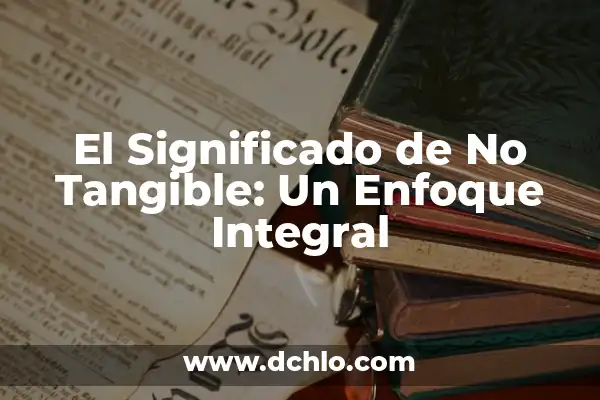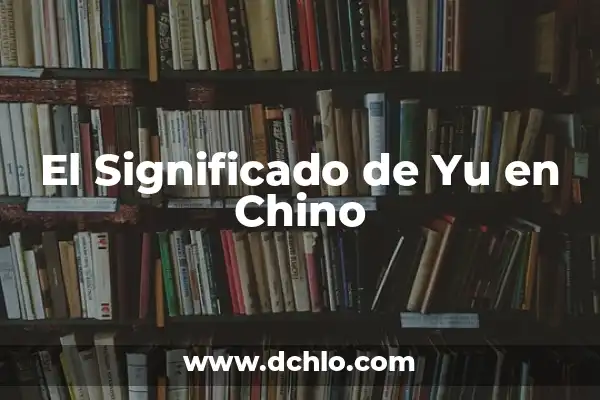Yu is a character in Chinese that holds multiple meanings, primarily revolving around desire, wish, and pleasure. This article delves into the various contexts and significance of yu, exploring its historical roots, cultural nuances, and modern usage.
¿Qué Significa Yu en Chino?
Yu (欲) is a Chinese character that primarily translates to desire or wish. It can also signify pleasure or joy, depending on the context. This character is fundamental in discussions about human emotions and motivations in Chinese philosophy.
– Historical Context: In Confucian texts, yu is often discussed in relation to moral behavior, emphasizing the balance between desires and ethical conduct.
Explorando el Concepto de Deseo en la Cultura China
The concept of desire, represented by yu, is deeply rooted in Chinese culture and philosophy. It is not merely a physical or emotional state but is also explored in spiritual and moral discussions.
También te puede interesar

Significado de Yu Ching Fu: Un Enfoque Integral
Yu Ching Fu es un término que proviene de las artes marciales chinas y se refiere a una filosofía que combina técnicas físicas y mentales para alcanzar la perfección en el combate. Aunque su nombre puede parecer misterioso, su significado...

El Significado del Saludo en el Kung Fu
El saludo es una práctica común en muchas disciplinas, y en el Kung Fu, este gesto adquiere un significado especial. Más allá de ser una mera cortesía, el saludo en el Kung Fu representa respeto, disciplina y armonía. Aunque muchos...

Significado de Vela en Vaso: Un Enfoque Integral
La vela en un vaso es un tema que combina lo físico con lo metafórico, ofreciendo más que una simple fuente de luz. En este artículo, exploraremos su significado, desde lo literal hasta lo simbólico, y cómo se integra en...

El Significado de No Tangible: Un Enfoque Integral
En un mundo donde lo físico y lo material tienen un lugar destacado, surge la pregunta de qué es lo no tangible. Este término se refiere a elementos que no tienen una presencia física, pero que son esenciales en nuestras...

Kung Fu Panda 4 Estreno España: Fecha de Lanzamiento y Novedades
La saga de Kung Fu Panda ha sido un éxito en taquilla y entre los fanáticos de la animación. Desde su estreno en 2008, la serie ha ganado premios y reconocimientos, convirtiéndose en una de las franquicias más queridas de...

Juegos de Cartas Yu Gi Oh: Guía Completa y Actualizada
Los juegos de cartas Yu Gi Oh son una de las franquicias más populares y reconocidas en todo el mundo, con una base de fans leales y una gran variedad de productos y contenidos relacionados. Desde su creación en 1996,...
– Philosophical Discussions: In Daoist philosophy, desire is viewed as a natural part of life, but excess desire can lead to imbalance. The concept of wu-wei (non-action) sometimes involves managing desires to achieve harmony.
Ejemplos del Uso de Yu en Frases
Understanding yu becomes clearer when viewed in context. Here are some examples:
- Yu como deseo: Wo yu qu Zhongguo lüyou. (我欲去中国旅游) – I wish to travel to China.
- Yu en nombres: El carácter puede formar parte de nombres, como en Yuming, donde Yu se refiere a deseo o placer.
El Papel de Yu en la Literatura Clásica China
In classical Chinese literature, yu is a significant theme, often symbolizing the human condition’s complexities. It is explored in works like Dream of the Red Chamber, where desires drive the plot and character development.
– Literary Impact: The exploration of yu in literature highlights the tension between individual desires and societal expectations, a recurring theme in Chinese narratives.
5 Usos del Carácter Yu en el Chino Moderno
Yu remains relevant in modern Chinese, appearing in various contexts:
- Expressing wishes: Yu is used to express hopes or intentions.
- Describing pleasure: It can refer to enjoyment or satisfaction.
- In names: Common in given names, adding a meaningful element.
- Idiomatic expressions: Part of idioms that convey specific emotions or states.
- Cultural discussions: Featured in modern media and films, reflecting contemporary issues.
La Importancia del Contexto en el Carácter Yu
The meaning of yu significantly depends on context, making it a fascinating yet complex character. Its interpretation can shift based on the sentence’s structure and the speaker’s intent.
[relevanssi_related_posts]– Contextual Examples: In Yu can imply wish or desire, while in other contexts, it might denote pleasure or even lust, depending on the compound words it forms.
¿Para Qué Sirve el Carácter Yu en el Chino?
The character yu serves multiple purposes in Chinese, primarily to express desires, wishes, and pleasure. It is essential in discussions about emotions, ethics, and human nature.
– Cultural Significance: Yu is integral to understanding Chinese philosophy and literature, offering insights into cultural values and emotional expressions.
Conociendo el Carácter Yu en el Chino Mandarín
Yu (欲) is a crucial character in Mandarin, representing desires and wishes. Pronounced with the fourth tone, it is vital in various expressions and discussions about human emotions.
– Pronunciation: The fourth tone in yu is a sharp falling tone, distinguishing it from other homophones.
Yu en la Historia de China
Historically, yu has been central to philosophical debates, particularly in Confucianism and Daoism, where it was discussed in terms of moral guidance and the path to inner harmony.
– Historical Impact: The concept influenced ethical frameworks, emphasizing the balance between personal desires and communal harmony.
Descubriendo el Significado de Yu en el Chino
Yu signifies desire, wish, or pleasure, embodying complex emotional and philosophical concepts. Its meanings extend beyond the surface, influencing cultural and literary discussions.
– Cultural Depth: The character’s versatility in meaning reflects the richness of the Chinese language and its capacity to express nuanced emotions.
¿Cuál Es el Origen del Carácter Yu?
The origin of yu dates back to ancient China, derived from characters depicting the heart or mind, symbolizing desires and emotions.
– Etymology: The evolution of yu reflects the development of Chinese thought on human emotions and moral philosophy.
Yu en el Contexto de la Música y el Arte
In music and art, yu inspires works that explore desire and pleasure, often reflecting the interplay between beauty and restraint.
– Artistic Expression: The concept influences traditional arts, where controlled expression of desires is a theme.
¿Cómo se Utiliza Yu en el Lenguaje Cotidiano?
In everyday language, yu is used to express wishes, describe pleasure, and form compound words that convey specific emotions or states.
– Everyday Usage: Understanding its common uses aids in grasping spoken and written Chinese.
Ejemplos de Uso del Carácter Yu en Contextos Modernos
Modern contexts include:
- Social Media: Expressing wishes or desires online.
- Advertising: Highlighting pleasure or enjoyment.
- Literature: Continuing its role in contemporary writings.
INDICE

